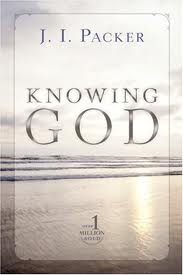Reading Reflection

November 29, 2011
 Knowing God, J.I. Packer (IVP, 1973)
Well it is official. The Christmas season is here. The stores can now legitimately play Christmas music. They can all compete to create that sense of magic that we all feel during this holiday season. But candy canes, colorful lights, and blow-up yard ornaments aren't really magical. The Christmas holiday celebrates one of the craziest mysteries of all. Packer explains:
Knowing God, J.I. Packer (IVP, 1973)
Well it is official. The Christmas season is here. The stores can now legitimately play Christmas music. They can all compete to create that sense of magic that we all feel during this holiday season. But candy canes, colorful lights, and blow-up yard ornaments aren't really magical. The Christmas holiday celebrates one of the craziest mysteries of all. Packer explains:
But in fact the real difficulty, the supreme mystery with which the gospel confronts us, does not lie here at all [he was discussing the atonement, resurrection, and Gospel miracles]. It lies not in the Good Friday message of atonement, nor in the Easter message of the resurrection, but in the Christmas message of Incarnation. The really staggering Christmas claim is that Jesus of Nazareth was God made man--that second person of the Godhead became the "second man" (1 Cor 15:47), determining human destiny, the second representative head of the race, and that he took humanity without loss of deity, so that Jesus of Nazareth was a truly and fully divine as he was human. Here are two mysteries for the price of one--the plurality of persons within the unity of God, and the union of Godhead and manhood in the person of Jesus. It is here, in the thing that happened at the first Christmas, that the profoundest and most unfathomable depths of the Christian revelation lie. "The Word became flesh" (Jn 1:14); God became man; the divine Son became a Jew; the Almighty appeared on earth as a helpless human baby, unable to do more than lie and stare and wriggle and make noises, needing to be fed and changed and taught to talk like any other child. And there was no illusion or deception in this: the babyhood of the Son of God was a reality. The more you think about it, the more staggering it gets. Nothing in fiction is so fantastic as is this truth of the Incarnation (53).Packer goes on to explain that the Incarnation is the true stumbling block for unbelievers. They may have problems with many of our doctrines, but the foundation of them is that God became man. He goes on:
If Jesus had been more than a very remarkable, godly man, the difficulties in believing what the New Testament tells us about his life and work would be truly mountainous. But if Jesus was the same person as the eternal Word, the Father's agent in creation, "through whom also he made the worlds" (Heb 1:2 RV), it is no wonder if fresh acts of creative power marked his coming into this world, and his life in it, and his exit from it. It is not strange that he, the Author of life, should rise from the dead. If he was truly God the Son, it is much more startling that he should die than that he should rise again (54).So as you are walking down the holiday infested aisles or decorating your tree, meditate on this amazing wonder! I have been blessed with the reminder of the miraculous mystery of the Incarnation. So often I have tried to move passed the "baby in the manger" imagery that you get stuck in as your child-like picture of Jesus, or I have focused so much on the humility of the cross, that I stopped being amazed at the truly mysterious, humbling wonder of God's Son becoming man. These words from Packer are a great model to use in witnessing this holiday season. And on a side note, many Christians speak today of "living incarnationally." I think that this excerpt points to something far more glorious than I can do myself. I can't live incarnationally anymore than I can be both divine and human and descend into a manger to save the world from their sins. But I can live in the light of this wonderful, amazing grace that has been given to me. I am thankful for that, and want to proclaim his works to anyone who will listen.




